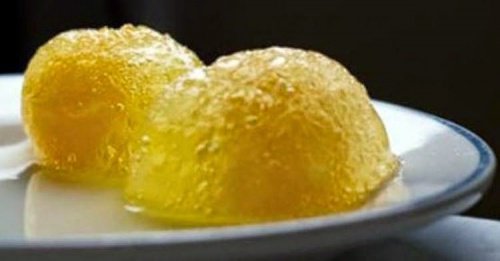Why Is Frozen Lemon Therapy So Good for Your Health?


Written and verified by psychologist Valeria Sabater
On our blog we’ve often mentioned the wonderful benefits of drinking lukewarm water with lemon in the mornings. Did you know, however, that there are also medicinal qualities in frozen lemon therapy? It’s a therapy that’s proving very popular, and which takes full advantage of all the properties this healthy fruit can provide.
The main secret of frozen lemon therapy is how it uses, in a simple and delicious way, the part of the lemon that is often forgotten: the rind or peel. Want to know how? Read on and find out!
Why is the frozen lemon therapy so beneficial?
In the first place we must explain why it is called the frozen lemon therapy. Many people suffering from cancer often use this remedy as a “complement” to their chemotherapy sessions.
The reason for this is based on lemons’ antioxidant power, and its ability to protect the natural defenses. Cancer patients undergo, as you know, some very aggressive treatments that aggressively attack the immunological system, as confirmed in this study conducted by the Isfahan University in Iran.
However, we cannot at all say that this therapy is an anticancer remedy. It is, as we’ve said, a complementary therapy that can help to strengthen the patient through a good diet.
Here are some more of its benefits:
1. A natural storehouse of vitamins
Lemon peel has at least 10 times more vitamins than its juice! It’s amazing to learn that a lemon’s best virtues are hidden in its outer layer. It’s the part that we usually avoid – we usually throw out the peel and just retain the juice.
Here are the vitamins that frozen lemon therapy will give you:
- Pectin
- Vitamin C
- Flavonoids like tangerine
- More than 22 different compounds capable of slowing cell oxidation. This is confirmed in this study conducted by National Research Center in Sudan.
2. Protect and strengthen the immunological system
Frozen lemon therapy can fight many of the daily illnesses we are constantly exposed to, as confirmed by the previously mentioned study from the Isfahan University. Some examples of these are the classic cold, infections and the flu.
There are many people that prepare delicious infusions from lemon peel. However, we should take note that by cooking the lemon it loses up to 40% of its properties. On the other hand, if it’s frozen, then we conserve all of its benefits. Added to that, it’s very easy to eat, as well as being delicious!
3. Frozen lemons to lose weight
As you know, lemons are a very useful fruit to lose weight in a healthy way, always ensuring we have a healthy diet.
According to this investigation by the Sugiyama Jogakuen University in Japan, lemon polyphenols are suitable for the treatment of diabetes, as well as for the prevention of obesity. Logically, we must always accompany it with an adequate diet.
See also: Five Key Ways to Control Cholesterol
How do you prepare frozen lemon?

Preparing your frozen lemon therapy is so simple that, from now on, you’ll never want to do without it in your daily routine. And not only because it is easy to prepare, but also because of its flavor and the great dishes you can prepare with it. Here’s what you need to do:
What do I need?
- 2 lemons
- A grater
How do I prepare it?
It’s as simple as placing 2 lemons in your freezer for one entire day. There’s no secret about that. Some people cut them into two or three pieces beforehand, in order to make it easier to grate them afterwards. However, we strongly recommend that you freeze them whole.
How do I consume my frozen lemons?

As we mentioned previosuly, we recommend consuming 75 grams (2.65 ounces) of frozen lemon each day. To do this, what you’ll do is grate the lemons once they are completely frozen.
Straight away you’ll notice its wonderful natural fragrance! You’ll be able to include them in different dishes to give them a really original touch. Here are a few simple examples:
- Include 25 grams (0.8 ounces) of frozen grated lemon in natural yogurt without sugar.
- Add 25 grams (0.8 ounces) of frozen grated lemon to your salad for lunch. You can also add some spinach, nuts, fresh cheese, a few pieces of salmon and some cherry tomatoes.
- You can add frozen grated lemon to any of your fresh infusions, such as a chilled green tea others, ideal for the mid-afternoon!
- Frozen lemon also combines well in any fruit salad that you make. One delicious option is to prepare a bowl of chopped pineapple, three strawberries, half a kiwi, chopped nuts and about 25 grams (0.8 ounces) of frozen grated lemon on top.
The frozen lemon therapy technique helps us to make use of the benefits of the rind or peel which we usually throw out. Remember that, from now on, there are no excuses! You and your family can enjoy great health thanks to this simple remedy. Why not put two lemons in your freezer today?!
All cited sources were thoroughly reviewed by our team to ensure their quality, reliability, currency, and validity. The bibliography of this article was considered reliable and of academic or scientific accuracy.
- Limón. Federación Española de Nutrición. Recuperado de: http://www.fen.org.es/mercadoFen/pdfs/limon.pdf
- Crispín, P. L. M., Caro, R. R., & Ochoa, M. D. V. (2012, March). Pectina: Usos Farmacéuticos y Aplicaciones Terapéuticas. In Anales de la Real Academia Nacional de Farmacia (Vol. 78, No. 1). http://www.analesranf.com/index.php/aranf/article/view/1165
- Martínez-Flórez, S., González-Gallego, J., Culebras, J. M., & Tuñón, M. (2002). Los flavonoides: propiedades y acciones antioxidantes. Nutr Hosp, 17(6), 271-278. https://www.researchgate.net/profile/Javier_Gonzalez-Gallego/publication/10961859_Flavonoids_Properties_and_antioxidizing_action/links/0deec52a6b0057f327000000/Flavonoids-Properties-and-antioxidizing-action.pdf
- Sir Elkhatim, K. A., Elagib, R. A., & Hassan, A. B. (2018). Content of phenolic compounds and vitamin C and antioxidant activity in wasted parts of Sudanese citrus fruits. Food science & nutrition, 6(5), 1214-1219. https://www.ncbi.nlm.nih.gov/pmc/articles/PMC6060895/
- Fukuchi, Y., Hiramitsu, M., Okada, M., Hayashi, S., Nabeno, Y., Osawa, T., & Naito, M. (2008). Lemon polyphenols suppress diet-induced obesity by up-regulation of mRNA levels of the enzymes involved in β-oxidation in mouse white adipose tissue. Journal of clinical biochemistry and nutrition, 43(3), 201-209. https://www.ncbi.nlm.nih.gov/pmc/articles/PMC2581754/
This text is provided for informational purposes only and does not replace consultation with a professional. If in doubt, consult your specialist.








